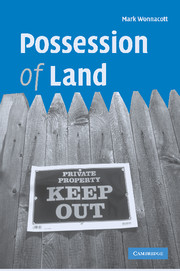Book contents
- Frontmatter
- Contents
- Preface and acknowledgments
- Table of cases
- Table of statutes
- Table of statutory instruments
- 1 Meaning of possession
- 2 Protection of possession
- 3 Possession, title and freehold land
- 4 Leases and licences
- 5 Mortgages and charges
- 6 Equity and trusts
- 7 Birth and death, dissolution and insolvency
- 8 Adverse possession and prescription
- 9 Possession judgments
- 10 Summary and conclusions
- Index
9 - Possession judgments
Published online by Cambridge University Press: 13 August 2009
- Frontmatter
- Contents
- Preface and acknowledgments
- Table of cases
- Table of statutes
- Table of statutory instruments
- 1 Meaning of possession
- 2 Protection of possession
- 3 Possession, title and freehold land
- 4 Leases and licences
- 5 Mortgages and charges
- 6 Equity and trusts
- 7 Birth and death, dissolution and insolvency
- 8 Adverse possession and prescription
- 9 Possession judgments
- 10 Summary and conclusions
- Index
Summary
Introduction
To explain the substantive law of possession is to tell only half the story. Enforcement is the other half.
For it is all very well to say that possession of an estate in land gives the possessor certain substantive rights, but those rights are valueless if they cannot be enforced. Indeed, to say that a litigant cannot enforce a right for a procedural reason, is to say that the wrongdoer has acquired a substantive right to commit the wrong.
Sometimes, the problem is worse. It is little consolation for someone, who has just been compelled to give up possession by enforcement of a court order, to be told that, as a matter of law, he or she has the better right to it.
In both situations, a book which dealt only with substantive rights would give a wholly misleading impression of the true position.
We have already seen, in the first eight chapters of this book, just how much the current substantive law of possession has been shaped and formed by the procedural rules of the past. This chapter is concerned with present procedural rules: it is about the nature of possession judgments, the methods and processes by which they are enforced, and some of the problems with those processes today.
- Type
- Chapter
- Information
- Possession of Land , pp. 145 - 160Publisher: Cambridge University PressPrint publication year: 2006



